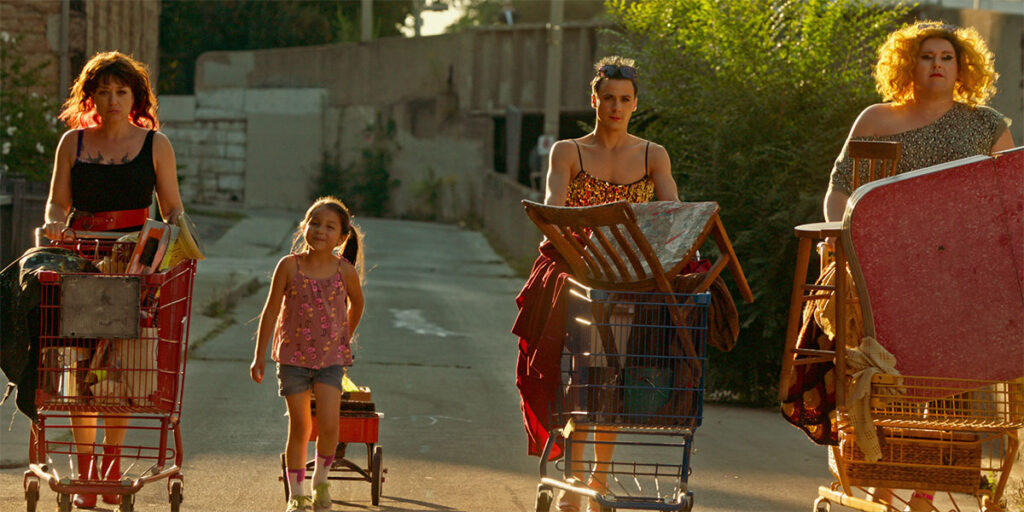Gail Maurice is a fluent Cree/Michif-speaking actor and an award-winning independent filmmaker and Arts Laureate. She is a recipient of the Hnatyshyn Foundation Indigenous Award for Excellence in the Arts, the Chalmers Arts Fellowship, and she was selected for the 2020 Netflix-Banff Diversity of Voices Initiative. Her film “Assini” won the audience choice award at the Dawson City International Film Festival, and was nominated for four Golden Sheafs at the Yorkton Film Festival. Her films have screened at Sundance, Traverse City Film Festival, the Smithsonian Institution, ImagineNATIVE, and have also aired on CBC, APTN, and Air Canada’s Enroute.
“Rosie” is screening at the 2022 Toronto International Film Festival, which is running from September 8-18.
W&H: Describe the film for us in your own words.
GM: “Rosie” is about an orphaned six-year-old Indigenous girl who’s forced to live with her reluctant francophone aunty and her two gender non-conforming best friends.
“Rosie” is about family, love, and resilience. No matter what the world throws at my characters, they hold their heads up high and fight on. Nothing can defeat them. They always have each other’s backs. They are a chosen family.
W&H:What drew you to this story?
GM: All of my films have themes of identity and family. I also often have Cree/Michif in my films because I want people to hear the beauty of my language. I made “Rosie” a bilingual film, French and English, because I wanted an opportunity to speak about my language, Michif, which is a combination of Cree and French.
There are only 1,130 Michif speakers in the world and I am one of them. My language is my culture, when I speak Cree/Michif, the words resonate and pulse in my bones and bloods. I can feel my ancestors in every breath and I want to be able to talk about that. Not many people in Canada have even heard the word Michif.
I also wanted to tell a story from a little girl’s perspective because children see the world through innocent eyes and a wondrous, open heart, with no judgement.
I wanted to show the strength of these characters with an ’80s-inspired sound track because the 80’s is when I “came out,” it’s when the world opened up to me in a whole new way and I had the best time of my life.
W&H: What do you want people to think about after they watch the film?
GM: Love. That all people need in the world is love and understanding. That no matter what happens to you, you can find a chosen family and make a new home. That all people are beautiful and resilient and no one, no matter what, is ever a “less than”.
W&H: What was the biggest challenge in making the film?
GM: Having many locations and getting some locations with just days before shooting, having a large ensemble cast, having to cut scenes to make my days, the heat (many days were 40 degrees Celsius – we had one of our leads get heat exhaustion and end up in emergency), and shooting during Covid right after productions were allowed to go back to shooting — a lot of crew were booked.
W&H: How did you get your film funded? Share some insights into how you got the film made.
GM: I got my film funded through Telefilm, the Indigenous Screen Office, and Ontario Creates.
W&H: What inspired you to become a filmmaker?
GM: I began as an actor and still love acting but I began writing and directing my own films because I was tired of auditioning for stereotypical roles and not seeing parts that reflected all facets of being an Indigenous woman. I thought, “Fuck it, I’m going to make my own films,” so I did.
W&H: What’s the worst advice you’ve received?
GM: The worst advice I think I ever received is, “Don’t join the Directors Guild of Canada. I should have joined years ago.
W&H: What advice do you have for other women directors?
GM: We are strong, powerful, amazing, brilliant. Let’s hold each other up and encourage each other to soar to the greatest heights ever! Let’s share our resources with each other. Let’s be there for each other and never give up! It’s taken me 20+ years to make my first feature film but I did it, dammit. Now, let’s get the party started and never stop.
If someone says “no,” move on and find another person or another way to tell your story. Reach out — I’m here for any woman director who needs me.
W&H: Name your favorite woman-directed film and why.
GM: This is a hard one. I love films by Gina Prince-Bythewood.
W&H: What, if any, responsibilities do you think storytellers have to confront the tumult in the world, from the pandemic to the loss of abortion rights and systemic violence?
GM: As an Indigenous filmmaker and person in the world, my very existence is political. My accent is political. All my films are political.
I see my responsibility as a storyteller is to always tell the truth from my perspective and that is through an Indigenous lens.
W&H: The film industry has a long history of underrepresenting people of color onscreen and behind the scenes and reinforcing — and creating — negative stereotypes. What actions do you think need to be taken to make Hollywood and/or the doc world more inclusive?
GM: As a woman and an Indigenous filmmaker, I think the first thing that needs to be done is to get through the doors, then trust us to tell our own stories. Most importantly, give us funds to make our own films. Let us in. Paid internships and then hire afterwards, if you are afraid.







